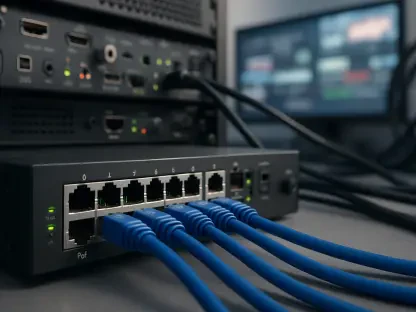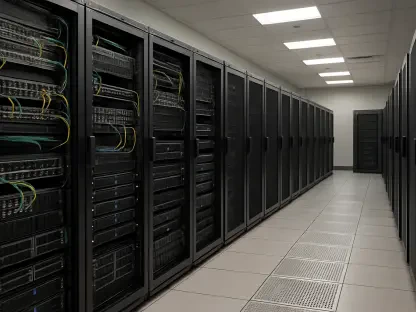Zoho Corporation’s latest innovation, Zoho IoT, promises to disrupt the industry with its groundbreaking features and applications. As a low-code, scalable platform, Zoho IoT is poised to transform how businesses operate, providing real-time data insights, enhancing efficiency, and improving overall customer experiences. This article explores the platform’s many features, its target industries, and the potential impacts on business operations across various sectors.
Zoho IoT: Introduction and Key Features
A Low-Code, Scalable Solution
Zoho IoT stands out as a user-friendly, low-code platform that simplifies the development of IoT applications. Its scalability allows businesses to start small and expand their IoT capabilities as needed. This flexibility makes it ideal for both startups and large enterprises. By enabling rapid deployment and iteration, business developers can swiftly address evolving operational requirements and market demands. This characteristic reduces the complexity and time investment traditionally associated with IoT application development, significantly lowering the barrier to entry for companies aiming to utilize IoT.
The platform’s low-code nature democratizes IoT development, allowing individuals without extensive programming expertise to build and manage sophisticated IoT applications. This approach not only accelerates development cycles but also fosters innovation by enabling more stakeholders within an organization to contribute to technological advancements. Zoho IoT’s user-friendly interface and drag-and-drop capabilities ensure that businesses can focus on optimizing their processes and deriving insightful analytics from operational data without getting bogged down by coding intricacies.
Integration with Third-Party Hardware
One of the standout features of Zoho IoT is its seamless compatibility with third-party hardware. Businesses can integrate their existing devices and sensors, facilitating a smooth transition and reducing the need for additional investments in new hardware. This interoperability is crucial for industries looking to enhance their digital ecosystems without significant upfront costs. By supporting a wide range of devices and communication protocols, Zoho IoT enables companies to harness their current technological infrastructure while expanding their IoT capabilities incrementally.
The smooth integration with third-party hardware not only provides cost savings but also shortens the deployment timeline. Firms can swiftly onboard their prevalent machinery, devices, and sensors into the IoT environment, minimizing disruptions to their ongoing operations. The platform’s rich API library and robust interoperability framework ensure that data from diverse sources can be aggregated and analyzed collectively. This unified approach helps in generating holistic insights, thereby enhancing predictive maintenance, optimizing resource allocation, and improving overall operational efficiency.
Advanced AI Capabilities
Zoho IoT incorporates powerful AI capabilities, enabling businesses to develop custom solutions more quickly and efficiently. These features help in analyzing vast amounts of data, providing actionable insights that can be used to forecast trends, optimize processes, and improve decision-making. The integration of AI positions Zoho IoT as a cutting-edge tool in the IoT landscape, offering advanced functionality that extends beyond basic data collection. Businesses can leverage machine learning algorithms to identify patterns, predict future events, and automate complex processes, thereby gaining a competitive edge.
The AI-driven analytics within Zoho IoT foster proactive decision-making by delivering real-time insights and predictive modeling. This intelligence aids firms in preemptively addressing issues, optimizing supply chains, and refining customer experience strategies. Moreover, the platform’s AI capabilities personalize the data presentation, offering customized dashboards and reports tailored to specific business needs. This personalization ensures that the right data reaches the right stakeholders at the right time, facilitating informed decision-making across the organization.
Target Industries and Their Transformations
Industrial IoT: Enhancing Productivity and Efficiency
Improving Shop Floor Productivity
In the realm of Industrial IoT (IIoT), Zoho IoT offers tools that significantly enhance shop floor productivity. Businesses can monitor machine performance in real time, identify bottlenecks, and implement immediate corrective measures. This real-time monitoring ensures that productivity is maintained at optimal levels. By providing granular visibility into shop floor operations, Zoho IoT enables managers to track key performance indicators with unprecedented accuracy, leading to more informed and agile decision-making.
The platform’s advanced analytics transform raw operational data into actionable insights, allowing firms to streamline their production processes. This heightened visibility not only improves efficiency but also facilitates proactive management of resources and schedules, leading to reduced waste and higher output quality. The real-time feedback loops created by Zoho IoT help maintain a sustainable and responsive production environment, where issues can be preemptively addressed, and opportunities for optimization can be swiftly capitalized upon.
Enhancing Machine Uptime and Maintenance
Zoho IoT provides predictive maintenance solutions that minimize downtime. By analyzing data from various sensors, the platform can forecast potential machine failures and schedule maintenance before issues escalate. This predictive approach reduces maintenance costs and maximizes machine uptime, directly impacting the bottom line. Early detection of anomalies and potential failures enables maintenance teams to take corrective actions proactively, thus avoiding unplanned downtimes and expensive repairs.
The data-driven maintenance strategies facilitated by Zoho IoT ensure that equipment operates at peak efficiency. This minimizes disruptions, optimizes the use of spare parts, and extends the lifespan of machinery. Additionally, the platform’s analytics can identify patterns associated with recurring issues, facilitating root cause analysis and continuous improvement initiatives. By integrating maintenance data with broader operational analytics, businesses can achieve a holistic understanding of their production ecosystems, driving enhancements in both performance and reliability.
Smart Buildings: Centralized Control and Monitoring
Comprehensive Asset Management
For smart buildings, Zoho IoT delivers a centralized platform for monitoring and managing assets. From HVAC systems to lighting and security, the platform provides a unified view of all building operations, ensuring efficient resource utilization and enhancing tenant satisfaction. Centralized control allows facility managers to oversee multiple systems from a single interface, streamline maintenance tasks, and respond promptly to issues. This holistic approach to asset management contributes to creating more responsive and adaptable building environments.
Through its centralized dashboard, Zoho IoT offers detailed analytics and reporting capabilities, providing insights into usage patterns, equipment performance, and energy consumption. These insights help building managers to implement data-driven strategies for optimizing operational efficiencies and reducing operational costs. The integration of IoT sensors and devices with the platform ensures real-time monitoring and automated adjustments, enabling the building systems to dynamically respond to changes in occupancy, weather conditions, and user preferences.
Optimizing Energy Usage
Energy management is a critical component of smart building operations. Zoho IoT offers detailed insights into energy consumption patterns, allowing building managers to implement energy-saving measures. This leads to reduced operational costs and supports sustainability initiatives. By analyzing data from various sensors and devices, the platform can identify inefficiencies, optimize energy use, and provide recommendations for further improvements. This proactive approach to energy management ensures that buildings operate sustainably while reducing expenses.
With Zoho IoT’s advanced analytics, building managers can track and compare energy usage across different zones and periods, uncovering trends and anomalies that might indicate wastage or inefficiencies. Automated controls can be employed to adjust settings in real time, such as dimming lights in unoccupied areas or optimizing HVAC settings based on weather forecasts. These automated and data-driven adjustments lead to significant energy savings and contribute to meeting regulatory and environmental standards.
Energy Management: Efficiency and Oversight
Strategic Energy Planning
In the energy sector, Zoho IoT facilitates strategic planning and efficient energy usage. By providing comprehensive data on energy consumption, the platform enables businesses to develop more effective energy strategies, ensuring that resources are used efficiently and sustainably. Real-time dashboards display key performance metrics, aiding energy managers in making data-driven decisions that optimize usage patterns and forecast future demands. This leads to more resilient and adaptable energy management frameworks.
Zoho IoT’s robust analytical tools help companies in the energy sector to simulate various scenarios and evaluate the potential impacts of their energy decisions. This capability is vital for long-term planning, where factors such as peak demand times, tariff structures, and sustainability goals can be balanced to achieve optimal energy efficiency. Comprehensive reporting functions further support regulatory compliance and help in identifying opportunities for cost savings and performance improvements.
Full Control and Oversight of Energy Usage
With Zoho IoT, energy managers have full oversight of energy consumption across various operations. The platform’s real-time monitoring capabilities provide instant feedback, allowing for immediate adjustments and optimization. This level of control is essential for maintaining operational efficiency and reducing costs. By integrating data from various energy-intensive systems, the platform enables a holistic view that enhances the ability to manage and optimize energy use across all facets of operations.
Enhanced visibility into energy usage patterns empowers managers to identify excessive consumption periods and areas that need improvement. This facilitates targeted interventions that can result in meaningful reductions in energy waste. The platform’s predictive capabilities further aid in anticipating future consumption trends and identifying potential savings opportunities. These data-driven insights lead to more effective energy management practices, supporting both operational efficiency and sustainability goals.
Connected OEMs: New Opportunities and Insights
Generating New Revenue Streams
For connected Original Equipment Manufacturers (OEMs), Zoho IoT opens up new revenue streams. By offering IoT-enabled products and services, businesses can create additional value for their customers. This not only enhances customer satisfaction but also drives new business opportunities. With IoT integration, OEMs can offer innovative features such as remote monitoring, predictive maintenance, and performance optimization services that add significant value to their core products.
The ability to capture and analyze usage data from deployed products enables OEMs to develop new business models based on service offerings. Subscription-based services, performance-based contracts, and customized solutions become feasible, allowing OEMs to diversify their revenue streams. IoT-enabled insights also help OEMs in understanding customer needs better and tailoring their offerings to meet those needs, thereby enhancing customer loyalty and opening new market opportunities.
Real-Time Insights and Remote Monitoring
Zoho IoT provides connected OEMs with real-time insights into product performance and usage. This data is invaluable for making informed business decisions, improving product designs, and offering remote monitoring services. Such capabilities ensure that OEMs remain competitive and innovative in their markets. By continuously monitoring product performance in the field, OEMs can gain critical feedback that helps in refining designs, enhancing durability, and adding features that meet market demands.
Remote monitoring capabilities enable OEMs to offer value-added services such as proactive maintenance, remote troubleshooting, and performance optimization. These services increase customer satisfaction by reducing downtime and ensuring optimal product performance. Real-time insights also facilitate faster response times to issues, reducing the need for on-site visits and lowering maintenance costs. This improved service quality strengthens customer relationships and positions OEMs as leaders in their respective industries.
Zoho’s Vision and Commitment to Customer Experience
Integrated Solutions for Streamlined Workflows
Zoho has consistently focused on creating integrated solutions that streamline business workflows. Zoho IoT is no exception, offering a platform that not only integrates with existing systems but also enhances overall business operations. This seamless integration ensures that businesses can leverage the full potential of IoT without the complexities of managing multiple disjointed systems. The platform’s capability to connect with various enterprise applications ensures a fluid data flow across the organizational infrastructure, promoting higher efficiency and better decision-making.
By unifying diverse business functions through a single IoT platform, Zoho IoT supports the creation of more cohesive and streamlined workflows. This integration reduces the silos within organizations, enabling a more synchronized approach to operations. The ability to gather, analyze, and act on data from various sources ensures that businesses can maintain agility and responsiveness in a rapidly changing market landscape. With Zoho IoT, companies can achieve greater operational synergy, driving innovation, and enhancing competitive advantage.
Security and Compliance
Security is a critical concern in today’s digital landscape. Zoho IoT incorporates robust security measures to ensure data privacy and compliance with global standards. This commitment to security assures businesses that their data is protected, enabling them to focus on leveraging IoT for operational improvements without worrying about potential vulnerabilities. The platform’s comprehensive security framework addresses key concerns such as data encryption, user authentication, and access control, ensuring that sensitive information is safeguarded against threats.
In addition to robust data protection, Zoho IoT’s compliance with global standards ensures that businesses can operate within regulatory frameworks confidently. Regular security audits, updates, and adherence to industry best practices help in maintaining the integrity of the platform. These measures provide peace of mind to organizations, knowing that their IoT deployments are secured against cyber threats. This focus on security and compliance allows firms to invest in IoT technologies with confidence, driving further innovation and operational excellence.
Conclusion: A Strategic Expansion into IoT
Zoho Corporation’s newest innovation, Zoho IoT, stands ready to revolutionize the industry with its impressive features and wide-ranging applications. This low-code, highly scalable platform is set to change the game for businesses, offering real-time data insights that can significantly enhance operational efficiency and elevate customer experiences. Designed to cater to various industries, Zoho IoT boasts a suite of tools that empower companies to harness the power of the Internet of Things. By integrating smart devices and using advanced analytics, businesses can streamline processes, reduce costs, and make data-driven decisions more effectively. The platform is tailored to serve sectors such as manufacturing, healthcare, and logistics, where the need for swift, informed decisions is critical. This article delves into the diverse capabilities of Zoho IoT and discusses its potential impact on transforming business operations. As companies continue to embrace digital transformation, Zoho IoT emerges as a pivotal solution enabling them to stay competitive, agile, and responsive in an evolving market landscape.









